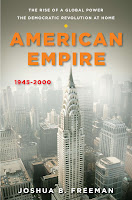On the fiftieth anniversary of the death of Marilyn Monroe,
the New York Times has a review of Lois Banner’s Marilyn: The Passion and the Paradox (Bloomsbury). Banner, a professor of history and gender
studies at the University of Southern California “presents a rich and often
imaginative narrative of Marilyn’s life,” writes Zoe Slutsky, “Monroe feels at
once like an earthly being— an almost-friend –
and an enigma, still slightly out of focus and just beyond reach. That seems right.” You can read the complete review here and you’ll
find a review of the book, along with three others about Monroe, in the LA Times.
Also in the New York
Times, reviews of two books on questions of philosophy and science: A review of Steven Gimbel, Einstein’s Jewish Science: Physics at the Intersection of Politics and Religion (Johns Hopkins University Press).
“It seems almost perverse that Steven Gimbel, the chairman of the
philosophy department at Gettysburg College, would want to bring back the old
epithet and give it another spin,” writes George Johnson, “he proposes ‘maybe
relativity is ‘Jewish Science’ after
all.’ What he means is that there might have
been elements of Jewish thinking that gave rise to what is now recognized as
one of the deepest insights of all time.” And, Sarah Bakewell reviews Jim Holt’s Why Does the World Exist? An Existential Detective Story (Liveright
Publishing/W.W. Norton & Company)
On American politics at home and abroad, the Wall Street Journal has a review of Joshua B. Freeman’s American Empire: The Rise of a Global Power,The Democratic Revolution at Home, 1945-2000 (Penguin). Arthur Herman writes, "Oddly, "American Empire: "The Rise of a Global Power, the Democratic Revolution at Home"—contrary to the proud spirit with which so many Americans view their country's postwar success—is a tale of almost unrelieved gloom. For Joshua Freeman, the "rise of global power" is the story of brutal imperial hubris, from the Cold War to the invasion of Iraq and the post 9/11 war on terror." You can also read a review of American Empire in the Boston Globe.
Carla Main reviews two books on post-Katrina recovery in New Orleans: Tom Wooten, We Shall Not Be Moved: Rebuilding Home in the Wake of Katrina (Beacon) and Daniel Wolff, The Fight for Home: How (Parts of) New Orleans Came Back (Bloomsbury)
Also in the Wall Street Journal:
Hector Tobar reviews Donald L.
Bartlett and James B. Steele’s The Betrayal of the American Dream (PublicAffairs).
Colman Andrews reviews two books about Julia Child: Bob
Spitz, Dearie: The Remarkable Life of Julia Child (Knopf) and Noel Riley Fitch, Appetite for Life (Anchor). Andrews writes: “I would call “Appetite for
Life” perhaps the better biography, with greater attention to detail. “Dearie,” though, is more entertaining.”
And Jonathan Lopez reviews Ken Perenyi’s Caveat Emptor: The Secret Life of An American Art Forger (Pegasus). He begins this way: “By his own
admission, Ken Perenyi is a liar, a cheat and a thief— but to give him his due,
he is also pretty brilliant. Over the
course of three decades, Mr. Perenyi duped auction houses, dealers and
collectors in the United States and Britain with hundreds of forged paintings
by his own hand, ranging from pseudo 17th century Dutch landscapes
to watercolors mimicking those of Alexander Calder.” Read on here.


